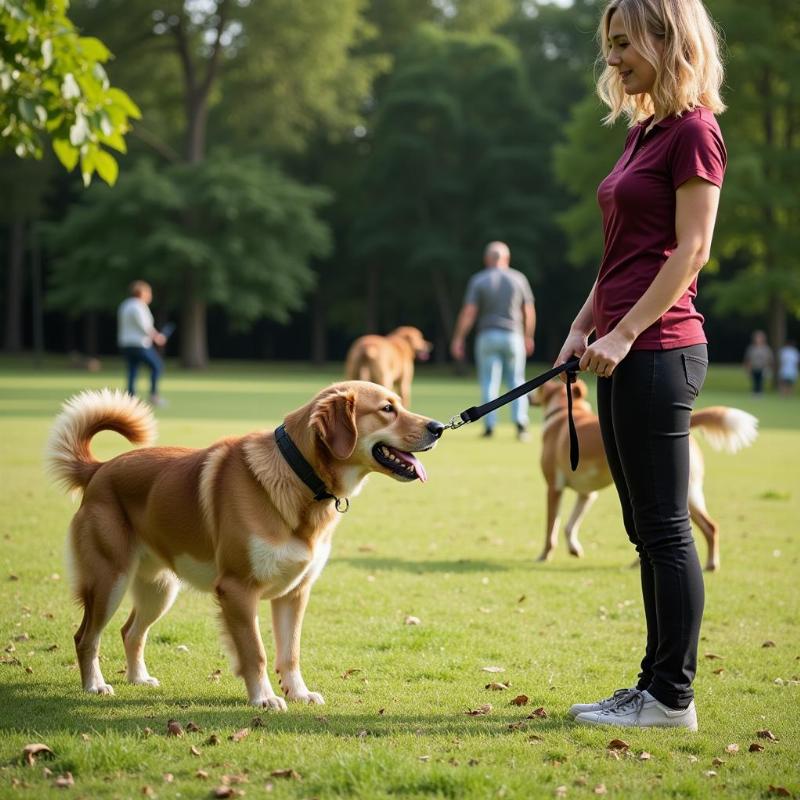Understanding what “unaltered dog” means is crucial for responsible pet ownership in the US. An unaltered dog simply refers to a canine that hasn’t been spayed (female) or neutered (male). This means they retain their reproductive organs and can breed. Knowing this is important because it impacts your dog’s behavior, health, and community responsibilities. Let’s explore the nuances of owning an unaltered dog in America.
Unaltered Dogs: Behavior and Health Considerations
Unaltered dogs, driven by their natural instincts, often exhibit behaviors directly linked to reproduction. Male dogs may mark territory more frequently, display increased aggression towards other males, and even attempt to escape to find a mate. Female dogs experience heat cycles, leading to mood swings and attracting male dogs. These behaviors can be disruptive and challenging to manage.
From a health perspective, unaltered dogs are at a higher risk for certain cancers, such as testicular cancer in males and mammary cancer in females. Additionally, unaltered females are susceptible to pyometra, a life-threatening uterine infection. Spaying or neutering significantly reduces or eliminates these risks.
The Responsibility of Owning an Unaltered Dog in the US
Owning an unaltered dog in the US carries significant responsibilities. Unintentional litters contribute to the overpopulation of shelter animals, a serious issue across the country. As responsible pet owners, we must prevent unwanted pregnancies. This involves understanding your dog’s reproductive cycle, managing their interactions with other dogs, and considering spaying or neutering.
Local ordinances and homeowner’s association rules often have specific regulations regarding unaltered dogs. These may include leash laws, containment requirements, and even mandatory spay/neuter programs in some areas. Be sure to familiarize yourself with the specific regulations in your community.
 Responsible Dog Ownership
Responsible Dog Ownership
American Kennel Club and Breeding Standards for Unaltered Dogs
The American Kennel Club (AKC) provides breed standards, which are detailed descriptions of the ideal characteristics of each recognized breed. While these standards don’t explicitly require dogs to be unaltered for conformation shows, breeding is a significant aspect of maintaining breed integrity. If you plan to breed your dog, adhering to AKC guidelines is crucial for responsible breeding practices. Understanding the AKC’s role in maintaining breed standards is essential for anyone interested in showing or breeding dogs.
Spaying/Neutering: A Conversation with Dr. Emily Carter
“Spaying or neutering your dog isn’t just about preventing unwanted litters,” says Dr. Emily Carter, DVM, a renowned veterinarian based in Chicago. “It’s a crucial step in safeguarding their long-term health and well-being. The procedure drastically reduces the risk of several types of cancer and other serious health issues.”
Conclusion
Understanding what “unaltered dog” means goes beyond a simple definition. It encompasses responsible pet ownership, understanding your dog’s behavior, prioritizing their health, and contributing to a solution for pet overpopulation. By choosing to spay or neuter, or by managing your unaltered dog responsibly, you are making a significant contribution to the well-being of your pet and the wider canine community in the US.
FAQ
-
What is the difference between spaying and neutering? Spaying is the surgical removal of a female dog’s reproductive organs, while neutering is the removal of a male dog’s testicles.
-
At what age should I spay/neuter my dog? This varies depending on breed and size, but typically between six and twelve months of age. Consult with your veterinarian for personalized advice.
-
Are there any risks associated with spaying/neutering? Like any surgery, there are potential risks, but they are generally low. Discuss these with your veterinarian.
-
Will spaying/neutering change my dog’s personality? Spaying/neutering can reduce certain hormone-driven behaviors, like aggression and roaming, but their core personality will remain.
-
Is it expensive to spay/neuter a dog? Costs vary, but there are often low-cost spay/neuter clinics available. Check with local shelters or animal welfare organizations.
-
What are the legal requirements for owning an unaltered dog in my state? Regulations vary by state and even locality. Contact your local animal control or city hall for specific information.
-
Where can I find more information about responsible dog ownership? The American Kennel Club (AKC) and the American Society for the Prevention of Cruelty to Animals (ASPCA) are excellent resources.
Beautdogs.us is your premier resource for comprehensive and reliable information on dog care, breed specifics, and products tailored for the American dog owner. Whether you’re a seasoned dog parent or just starting your journey, Beautdogs.us provides expert advice to ensure a happy and healthy life for your furry companion. From understanding what “unaltered dog” means to navigating the complexities of responsible dog ownership, we’re here to help. Contact us today! Email: [email protected], Phone: +1 501-555-7529. Visit Beautdogs.us for more valuable insights.